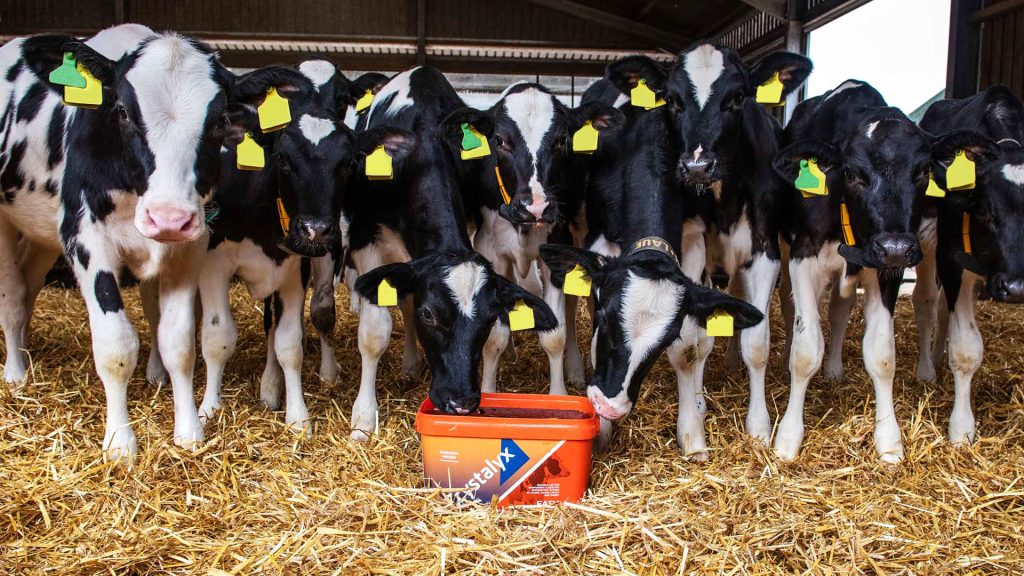Feeding calves – whether beef calves or replacement dairy heifers – is complex and costly. No matter how fine-tuned the system, there’s always opportunity to optimise…
Nutrition and housing are the two major impactors on calf performance. Calves need a clean and comfortable environment as well as a consistent and correct nutritional programme to grow and develop without any immunity-related challenges. In practice, this means:
- Provision of enough good quality colostrum and milk
- Consistent access to clean and fresh water from birth
- Early access to a grain-based starter feed with optimal protein and energy levels
- Clean, warm and ventilated housing with dry bedding
- Access to fresh and good quality forage
- Hygiene and biosecurity measures
- Correct grouping/mixing, particularly if calves coming from multiple farms
Early dry matter intakes is key
All calves are born a monogastric – this means they digest (milk) in the gut rather than the rumen. Even if growth rates are high and weaning ages are low, failing to develop the rumen pre-weaning will create growth checks and illness risks post-weaning. Developing the rumen and immune system depends on early dry matter intakes.
When start?
The earlier a calf starts ruminating, the better. Newborn calves with access to a feed pellet (and water!) from day 1 – 3 can start actively ruminating as soon as 5 days after birth. Intakes will only be small, but will start to increase at around 14 days of age. After 21 days, there will be enough rumen microbes to ferment feed into energy.
Calves can be weaned as soon as they are consuming >1kg of dry matter per day for 3 consecutive days, which can be achieved as early as 6 weeks if they start ruminating early enough.
What’s important?
When selecting a feed pellet, look for palatability and fermentable carbohydrate levels (i.e. starch from cereal grains). Like cows, the starch wants to be slowly fermentable and high in digestible fibre to avoid low rumen pH, low saliva rates, and slow volatile fatty acids (VFA) absorption. So, avoiding rapidly fermentable fibre sources such as beet pulp, brewer’s grains, soy hulls, and citrus pulp. The feed should also be offered in small quantities and kept out of the elements, so its nice and fresh.
How much?
According to recent research from NASEM, pre-weaned calves (less than 8 weeks of age) should be consuming 1.17% to 3.06% of body weight in dry matter – the more the better. This rate of dry matter intake (DMI) should then rapidly increase at weaning.
Promoting greater dry matter intakes can be a challenge, particularly in the pre-weaned calf. To recap, this can be influenced by:
- Feeding regularly in smaller quantities
- Checking the formula for palatability
- Weaning gradually over 3 weeks
- Providing clean and fresh water
- Offering free-access to chopped straw (2.5 – 3cm)
- Supplying a feed lick to young calves
Ever considered feeding calves Crystalyx?
Feeding calves feed licks is a nutritional strategy that many progressive farmers are now using to efficiently support rumen and immune development in both dairy calves and beef calves. Crystalyx offer two specialist solutions for increasing dry matter intakes in different environments:
Crystalyx Calf 100 and Crystalyx Easy Breather are both molasses-based feed licks manufactured using a patented ‘cooking’ process to drive out water to a very low 2 – 3% total moisture level. Both these feed licks are therefore dense in fermentable energy (sugar) to feed rumen microbes. This, in turn, promotes a more rapid digestion rate and greater appetite for more dry matter (calf pellets and forage).
Support rumen development with Crystalyx Calf 100
Crystalyx Calf 100 specifically contains butyrate fatty-acid in a solid feed format to support the development of the rumen tissue and villi. Butyrate is also palatable to help stimulate feed lick intakes. Crystalyx Calf 100 also contains Mannan oligosaccharides (MOS) to support gut health and immunity, and feed conversion efficiency. UK trial work has shown Crystalyx Calf 100 to increase daily liveweight gain by 5%, leaving calves 6kg heavier at 100 days.
Support respiratory health with Crystalyx Easy Breather
If respiratory health – most at risk in calves when immunity is fragile, and in the autumn/winter when the environment is cold/wet – is a problem, consider feeding Crystalyx Easy Breather. Formulated with menthol and eucalyptus decongestants, Crystalyx Easy Breather offers a natural aid to maintain a healthy respiratory system.
Crystalyx Easy Breather stimulates dry feed intakes, helping to improve growth rates, providing for stronger more vigorous livestock, better able to withstand a challenge. Inclusion of a unique MOS (mannan oligosaccharides) reduces the ability of pathogens to colonise the gut wall by binding with them, stimulating an improved immune response.


